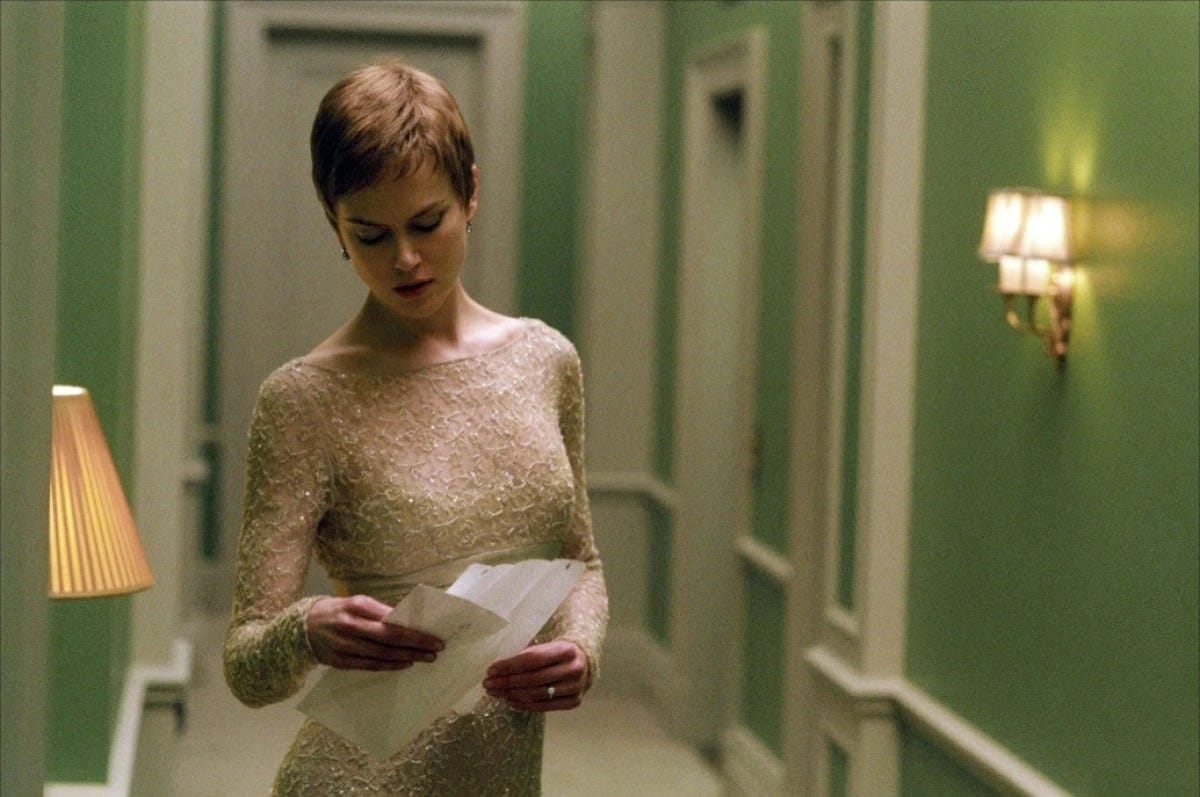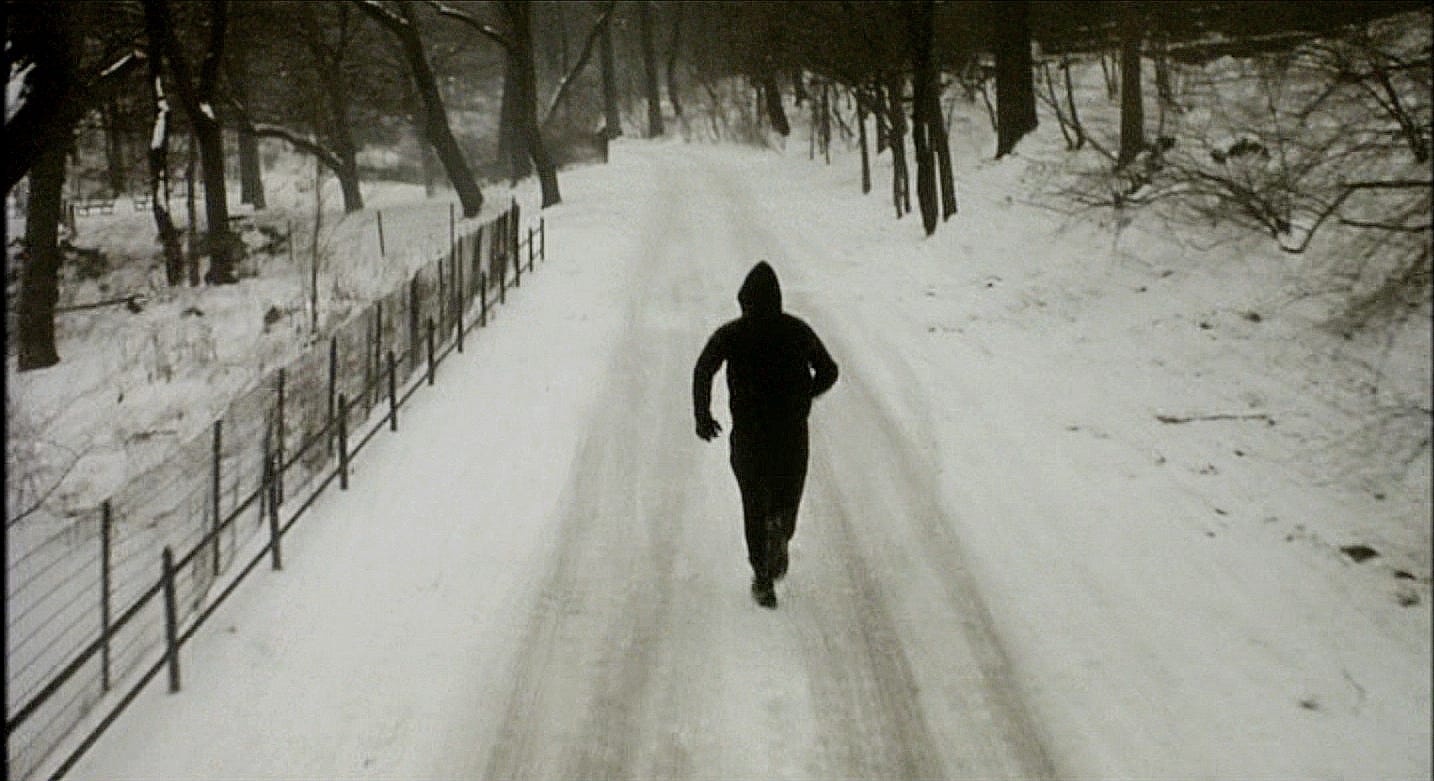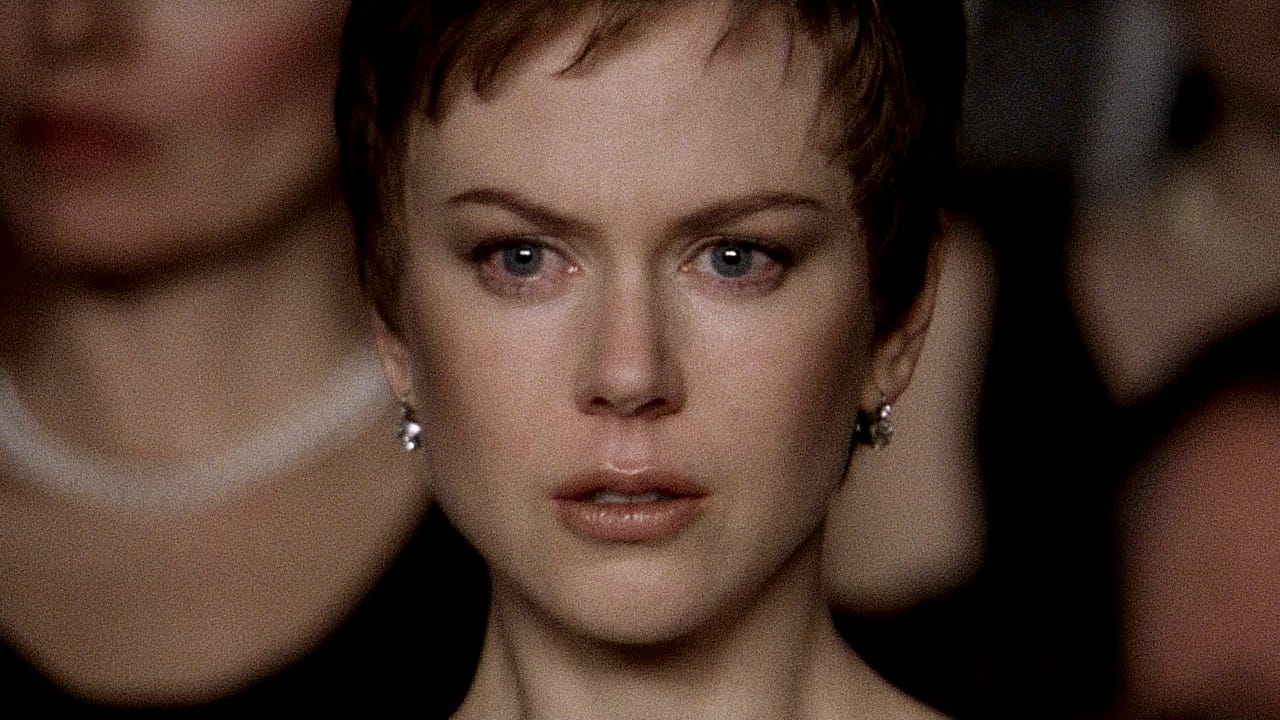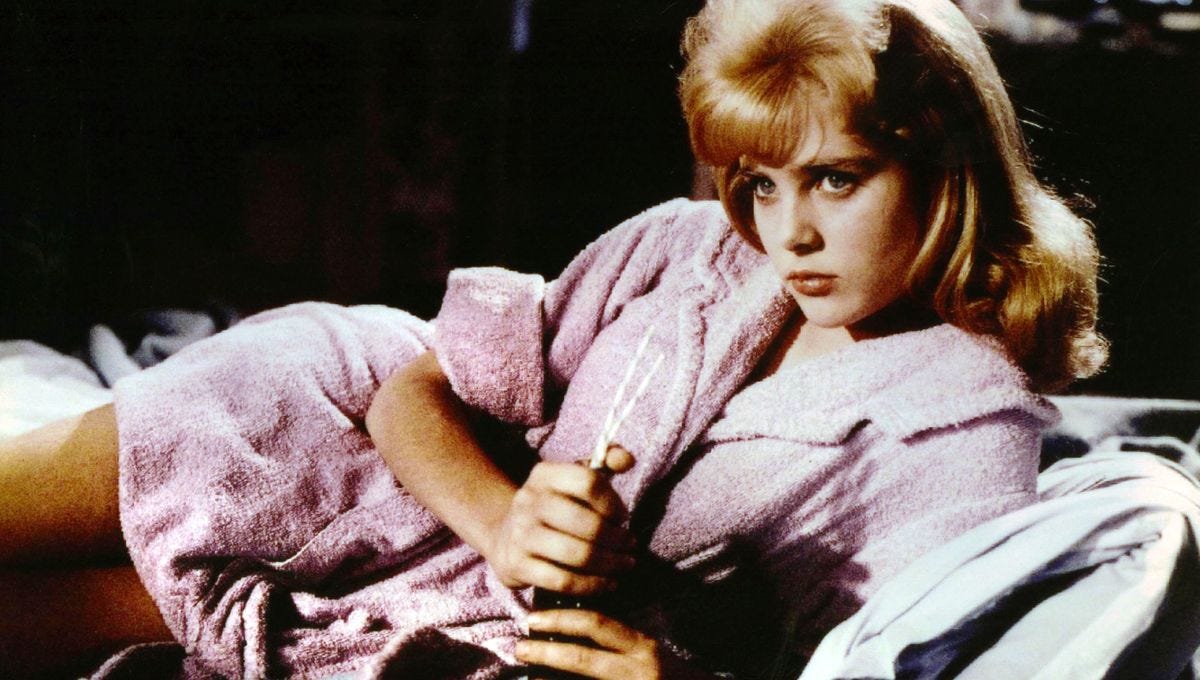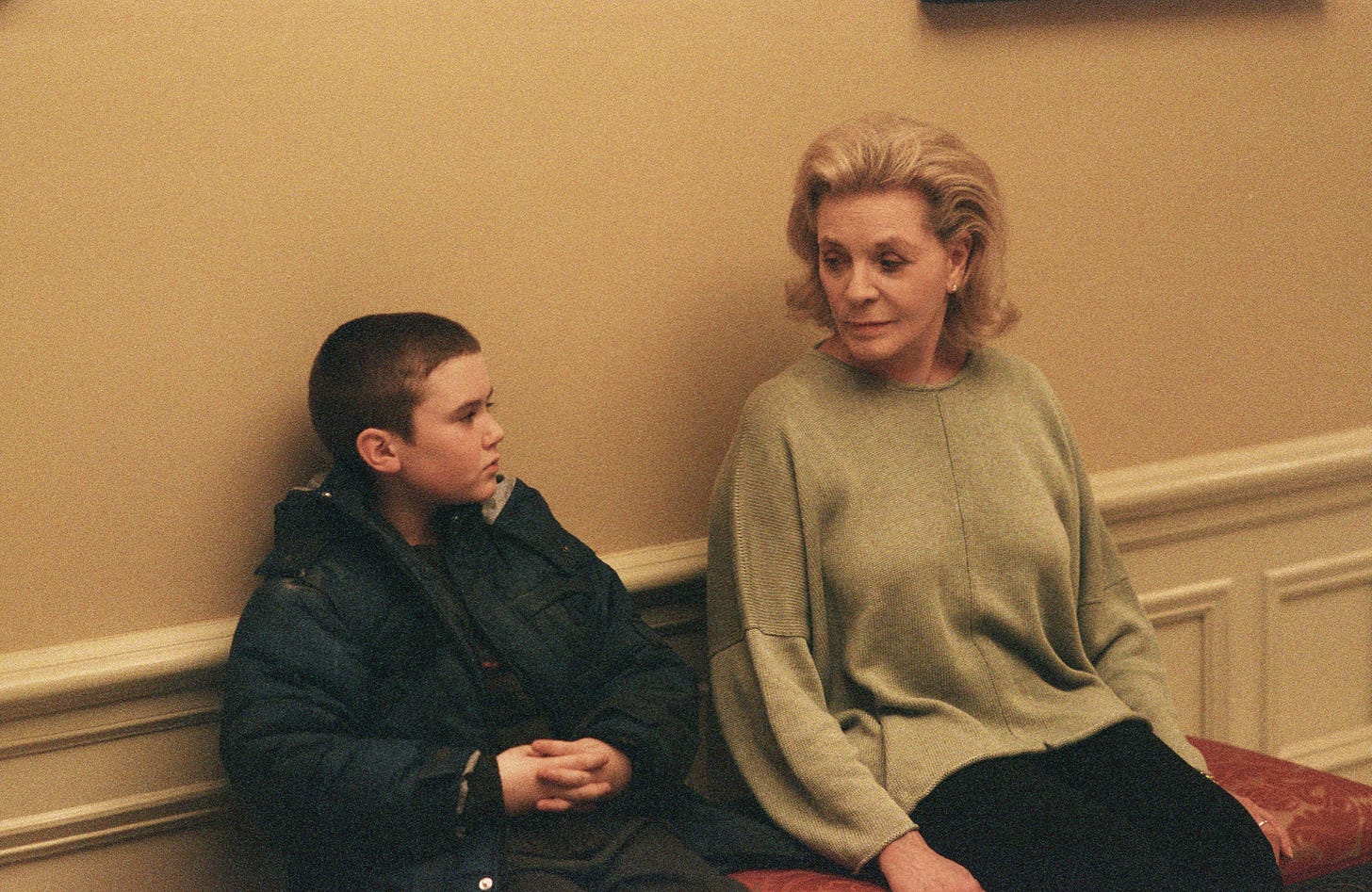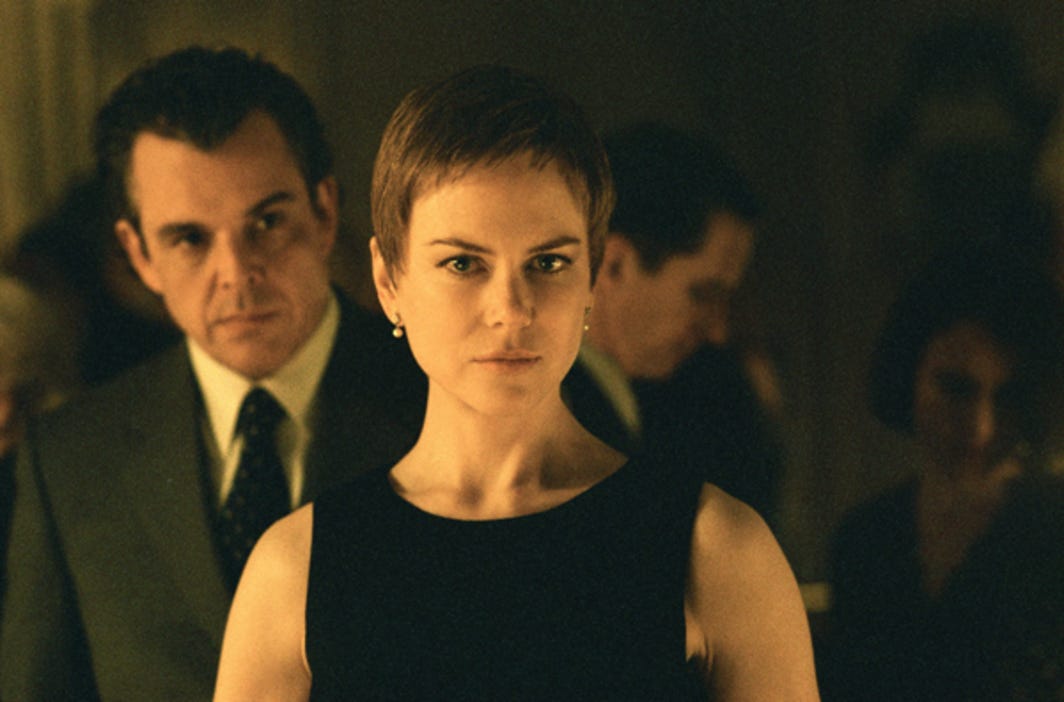'Birth': As Long As We Both Shall Live
Eternal love and pain in Jonathan Glazer's sublime 2004 masterpiece
If death is not the end, then birth may not be the beginning. Jonathan Glazer’s sublime and crushing 2004 masterpiece Birth asks a simple question: what if the end points of life as we know them aren’t as clear cut as we were led to believe? In Glazer’s commanding and operatic vision, love is the only force powerful enough to transcend mortality, inhabiting completely those it touches most deeply. When they die, they carry with them the memory of love, and when they are born again, it clings to them still, as fever perennially clings to those weak of body but strong of spirit.
Glazer’s stroke of genius when making Birth was deciding to focus not on the soul of the deceased, as it passes from body into ether, and then back into body, but on those who love leaves behind. When Anna’s (Nicole Kidman) late fiancé Sean, gone 10 years, is seemingly reincarnated as a 10 year old boy, she is faced with an impossible decision—believe him, face all the social consequences, and undergo the agony of reopening the oldest, deepest wound in her soul. Or doubt him, and suffer the death of her one true love all over again. In the end, Birth is beautiful and unbearable at the same time. Fall in love, and your life is redeemed, anointed. You gain a meaning outside of yourself, transcendental significance. But you will never escape it. As the Bukowski line goes, love is a dog from hell, and not even death will keep it from pursuing you, forever, sinking its teeth in, and ripping you apart.
Birth begins with a death, followed by a birth. And then there are a couple parties. DP Harris Savides opens the film on an exquisite scene—an enormously wide crane shot tracks a man we’ll come to know is Sean on his jog down a snow-trodden trail in Central Park. Alexandre Desplat’s magical, elliptical score begins to tinkle before the bass, cellos, and thundering timpani drums wash it through with mystery and foreboding dread. In the middle of a dark bridge tunnel, not unlike the dark, uterine passageway that leads unto life, Sean keels over and is delivered unto death. Inky images of a freshly born child being cleaned under rivulets of water flash across the screen. Then an inter title: “10 years later.”
Over the course of two parties, one for the engagement between Anna and her new beau Joseph (Danny Huston), and one for the birthday of Eleanor (Lauren Bacall), the matriarch of Anna’s family, Glazer introduces us to a world of frozen personalities and static social relations, where a woman like Anna, bruised over with grief, is left alone in the hope that the raw and toothy passion she still has for her now dead husband will simply dissipate. By finally consenting to marry Joseph, a man it’s clear she has a certain fondness, but no real feeling for, she has appeased her family, who more than happiness, more than anything, want normalcy.
The engagement party goes off without a hitch. Anna is polite and deferential, convincingly acting the part of the blushing bride. With her auburn pixie cut, full cheeks, and indefinable aura of sadness, Kidman can’t help but recall another iconic woman of New York cinema who had trouble with a child—Mia Farrow in Rosemary’s Baby (the connection to that film only deepens from here). Desplat cues us in to an incoming change, lurking underfoot—a low, throbbing, electronic beat begins to intone over the score, like a tiny heartbeat pulsing beneath the skin of the film. We cut from the penthouse to the lobby where Clara (Anne Heche), the wife of Sean’s brother, is gripping a gift-wrapped box and unable to enter the elevator. She invents an excuse and steals away to Central Park, where she buries the box in some brush not far from the site of Sean’s death.
On her way out of the apartment building Clara passes a young boy (Cameron Bright) who appears to study her carefully. He reappears at the next party, quietly slipping into the hallway the family apartment opens onto. The lights cut (we’re back in a dark, liminal passageway) for Eleanor to blow out her birthday candles, and he filters into the dining room unnoticed. Savides captures the entire family crammed into the corner of a room when the lights flick back on. Sean can be heard off camera, calmly announcing, “I’m here to see Anna.” Befuddled and mock-flirtatious, Anna agrees to speak privately to him in the kitchen. “I’m your husband,” he says. Anna jokes about the possibility—“if the timing had been a bit different…” but he cuts her off. “It’s me. Sean.” This Sean can answer questions—intimate questions—only the other Sean could answer, and Bright delivers lines with a mature gravity that absolutely compels you to believe him.
The rest of the film chronicles the fallout from Sean’s Earth-shattering revelation. Anna’s family descends into paranoia and righteous condemnation, the mysterious Clara grows more unpredictable and frightening, but the most captivating, soul-crushing, and ultimately consequential reaction to Sean’s revelation is Anna’s.
From the moment young Sean (whose name really is Sean) claims to be dead Sean, a small revolt begins to gestate within Anna. In the film’s most iconic scene, Anna and Joseph arrive late to a matinee performance of Wagner after a rattling confrontation with Sean. His father and Anna’s brother-in-law Bob pelt Sean with demands that he averrs. “Tell her you’ll stop bothering her.” “No.” “Tell her why you’re doing this.” “I can’t.” Anna utters her own heart-rending warning, low enough that only Sean can hear it: “You’re hurting me. Do you understand that?” As Anna and Joseph leave the apartment unresolved, the shrieking horns which herald the prelude to Act I of Die Walküre cannon into the silence. Sean faints, sinking to the floor in the same way that elder Sean collapsed in Central Park. Utterly shaken, Anna hurries to take her seat at the concert. Glazer’s camera slowly zooms in to Kidman’s face for over three minutes without cutting, and Kidman gives the performance of her career. She stares straight ahead without blinking. Small, hot tears erupt on the bottom lids of her eyes. The drums cascade down and the strings crescendo up in a storm of melodramatic rapture. You can see Anna thinking through every possible scenario, weighing the costs of every outcome. Ten long years she fought keep her dead lover’s memory at bay. And just like that, the feelings come rushing back with unyielding force.
Birth has been called a film about grief by the few critics charitable, or brave enough to write fairly about it. When I first watched Birth it completely knocked me off my feet. I cried for hours after it ended, thinking about my mother who died when I was 21. Nothing before and nothing since has so viscerally captured the reckless, life-ruining, magical thinking that maybe the death was a mistake and they’ll come back to us. In dreams, as a zombie, if we decide to die, however. And yet as I watch the film more and more, I see that it goes deeper than grief. Birth is about the agony of love’s persistence, even in spite of death.
“I don’t want to fall in love again with Sean. You understand?” Anna tells Sean’s brother Clifford, who she visits in desperation. “And that’s what’s happening. I need you to come and help me, I need you to talk to him, and I need you tell him to go away. Because I can’t do it.” Anna is powerless before the prospect of her eternal lover returning to this Earth. That Sean comes back as a 10 year old is immaterial; he could have come back as a flea and she would react the same way. Birth in this way operates in the tradition of Lolita, where irredeemable taboo is deployed as a means of stupefying the audience, or the reader, and then focusing their rapt attention on the real matter at hand. The seductive, manipulative power of language in the case of Lolita, and in the case of Birth, the desperate, ferocious, pathetic slaves that love makes us once it’s given fully and then taken away. It’s not at all a movie about pedophilia. You might think this is gross, but Glazer shows, and I think he’s right, that anyone as in love with Sean as Anna was would resort to pedophilia and much worse in order to preserve the bond of love that gave her life.
Anna begins the movie a husk of a person. She shuffles from social engagement to social engagement, listless and numb, and everyone sees it. Once the fire of Sean’s love is brought back to her hearth, she finally warms up, even if it’s manic, unsustainable, and as Eleanor eventually points out, illegal. But the nectar of undying devotion proves too sweet to resist. Sean says to Bob after answering several of his “are you really Sean” questions correctly, “Look, you can think whatever you want. Everybody can think what they want. You can talk to who you want. It doesn't matter. I’m Sean, I love Anna, and nothing's going to change that. Nothing. That’s forever.”
Anna fully buys in at the exact moment that the traps Glazer carefully laid in the film’s opening minutes all start firing off. Clara corners Sean and reveals the mysteries of the buried box—it was full of unopened love letters from Anna that he gave Clara, his mistress, to prove his love to her. Presumably, this is at least one path the viewer can follow the film down, Sean followed Clara to the park the night of the engagement party, dug the box up, and studied the letters. He flees Anna’s apartment in shock and heads straight back to the primal scene: Central Park.
“I have to go tell Anna I’m not her husband,” he reasons to a cop who interrupts his delirious walkabout. “I thought I was Sean, but I found out he is in love with another woman. So I can’t be him, because I’m in love with Anna.” There aren’t words in the English language to describe the depths of feeling Kidman conveys after Sean tells her he isn’t Sean. In several interviews over the years, Kidman has described Birth as the film she still feels closest to, and the one she wishes more people would see. It’s easy to understand when you see representations of cosmic-scale feelings this acute and honest.
Birth’s final scene takes place on a beach, at Anna’s wedding to Joseph. The whole, mad ordeal with the child-husband has ended, and Anna’s family is finally comfortable again. Anna has delivered a searing, perhaps too honest apology to Joseph: “What happened to me was not my fault. There was no way I could have behaved any differently. There was no way I could have said to him … go away. I couldn’t do it. It was a mistake, and I’m sorry.” The cake is frosted, the guests chat pleasantly. Everything has returned to normal. And Anna, posing for bridal photos, stares straight ahead, unable to smile, or even hold up her bouquet. Sean delivers Birth's last lines. They are the most brutal lines of the film, spoken in voiceover, from a final letter he wrote Anna: “The doctors said they still haven’t figured out what was wrong with me. But, they said the good thing is that nothing really happened. Well, I guess I'll see you in another lifetime.”
The good thing is nothing really happened rings out over an image of Kidman bound like a corpse in a thin, soiled wedding dress, careening over the waves. She’s run out of her own wedding, and Joseph’s come to bring her back. The last moments are wordless. Joseph hugs Anna, and the camera closes in on her face. We’ve seen birth and we’ve seen death. Now we see the undead. Anna is as white as a sheet. Blue veins stand out at her temples. Her eyes are as blank and heavy as stones. Her jaw is tense and her mouth hangs open. She head shakes slightly. Her arms are raised from her sides as if she might take flight, or fall to the ground at any second. She is trapped in a moment of perpetual disbelief. “Will you believe me?” Sean asked in his first letter to Anna. “Will you believe me?”
Anna’s life is irrevocably changed, and yet technically, nothing really did happen. Was Sean really Sean? Glazer leaves enough clues for either interpretation to be plausible. But either way, did it matter to Anna? Her longing for him was so fierce, and buried so close to the surface of her heart that it leapt out at even the most impossible, ridiculous chance of reunion. That’s the power of Birth. It is equal and opposite to the power of death. And both are reduced to nothing in the face of love.


